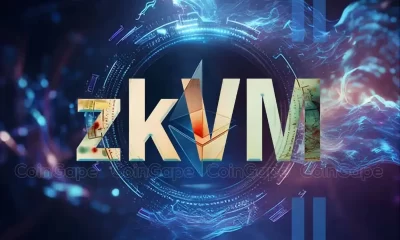Opinion
Bitcoin Open-Source Development Takes The Stage In Nashville
Published
4 months agoon
By
admin

Caught up in the storm of price action and US politics, it’s easy to forget the Bitcoin technology landscape had its own breakout earlier this year. Now that things have cooled off over the summer, next week’s Open-Source Stage at Bitcoin Nashville is a good opportunity to survey the industry’s progress.
Looking at this agenda, this year’s stacked lineup should be able to provide some signal amidst the electoral chatter. To warm us up for what promises to be an absolute marathon of an event, I’ve highlighted a handful of topics and talks to keep an eye on.
Technical innovation
Bitcoin builders will be looking to pick up on the momentum generated around “Bitcoin Season 2” in Nashville as the focus will remain on efforts to unlock Bitcoin’s programmability.
I previously discussed the arms race over all things BitVM and other purported layer 2s. The level of excitement around Bitcoin script has never been so high. Progress enabled by previous soft forks like Taproot and SegWit has led to various experiments, most motivated by the Ordinals craze. Naturally, the conversation has started to revolve around what comes next.
Unlocking expressivity with OP_CAT
Friday, July 26. 9:30 AM
Base58’s founder and everyone’s favorite Bitcoin educator Niftynei (Lisa) will look to set the tone on Friday morning by chairing a panel on the popular soft fork proposal OP_CAT. The hype around the script improvement proposal has not subsided and Bitcoin developers have been increasingly vocal about their affinity for CAT and its superpowers.
I expect co-panelists Andrew Poelstra, Director of Research at Blockstream, and fellow developers Rjindel & Brandon Black to make a strong case for the versatile script improvement.
BitVM: Pushing innovation without a soft fork
Friday, July 26. 10:00 AM
It’s hard to overstate the sheer brain power assembled in this talk. There is a reason BitVM has been the talk of the town since developer Robin Linus brought it onto the stage last year. The proposal has managed to attract an impressive crowd of builders and thinkers fascinated by the prospect of bringing fraud-proofs to Bitcoin.
With no working implementation yet, it also feels like crunch time for many of its promoters who have been talking a big game about its potential. The star-studded group of developers should be able to update us on the progress here and perhaps cut through the hype a bit.
Privacy at stake
Bitcoin’s legal battle for privacy: Free Samourai
Friday, July 26. 2:00 PM
The arrest of developers Keonne Rodriguez and William Hill in April sent shockwaves through the Bitcoin industry. Fixtures of the community for nearly a decade, both had been ardent proponents of Bitcoin users’ rights to privacy. Now that the dust has settled, questions linger about the case’s implications for open-source developers worldwide.
Veteran attorney Tor Ekeland who represented Roman Sterlingov in the high-profile “Bitcoin fog” mixer case will be joined by other panelists to discuss the US Department of Justice’s “abusive crypto prosecutions and the blockchain surveillance state.”
Making Bitcoin more private with CISA
Friday, July 26. 1:30 PM
This one is a little more obscure but will likely warrant attention from the more technical-minded folks. Cross-input signature aggregation, or CISA, is a proposal that has been floated in Bitcoin circles for many years already and was once envisioned as part of the Taproot upgrade.
The general idea is to allow transactions to combine signatures from multiple inputs into a single one, effectively reducing their overall weight, and therefore cost. The proposal surfaced back into public discourse a few months ago in the context of debates over much-needed privacy improvements to the Bitcoin protocol. Some have suggested that reducing the cost of collaborative, multi-input, transactions like coinjoin might incentivize further use of privacy tools.
Originally spearheaded by Blockstream Research, developer Fabian Jahr was recently awarded a grant by the Human Rights Foundation to research the topic further. He will be joined on stage by respected wallet developers Craig Raw of Sparrow Wallet and Jameson Lopp of Casa.
Bitcoin development
The state of Bitcoin Core development
Saturday, July 27. 11:00 AM
Bitcoin’s reference software implementation is the quiet giant of this industry. The diverse and diligent team of developers has historically preferred to remain out of the spotlight. Now that the technical space is heating up and the stakes are as high as ever, how are its contributors dealing with the increased attention?
Bitcoin Magazine’s own Aaron Van Wirdum will attempt to elucidate the inner workings of this tight-knit group and allow contributors like Ava Chow and Murch to share their thoughts on the project.
Bitcoin free banking
Ecash debate: what are the tradeoffs?
Saturday, July 27. 3:15 PM
I could not end this article without shilling at least one of the panels I will be involved in. Is it a replacement for centralized custodians? Is it a scaling solution? Nobody seems to agree on the role of ecash in the Bitcoin ecosystem but, if anything, it can’t be ignored anymore.
The rapid progress of projects like Fedi and the Cashu open-source implementation has garnered a significant amount of mindshare over the last year. Advocates celebrate its versatility and privacy gains while detractors claim it is no different than the banking system Bitcoin was built to obsolete.
Both sides will be represented on the panel which is shaping up to be an exciting conversation around the future of Bitcoin’s financial system.
There is a lot of excitement at the prospect of Bitcoin entering the big leagues but it’s hard to tell if the ecosystem is ready to accommodate this new influx of interest. Now that we are crossing the political chasm, it’s crucial to continue supporting the open-source culture that brought us here. Fortunately, the industry has never looked so ready to tackle this challenge. The diversity of initiatives on display at the conference is a testament to the maturing technical environment made possible by FOSS developers.
Source link
You may like


‘Very Promising Start’: Top Analyst Says Ethereum Headed Higher Against Bitcoin – Here Are His Targets


5 hidden gems to watch as the market gears up for 10,000% surge


BTC Monthly Chart Reveals Bull Market Target


AI bot transfers $50k in crypto after user manipulates fund handling


Perpetual DEX Hyperliquid to Launch Native Token Following Bullish October


Ethereum Foundation Invests Millions Into zkVM, What’s Happening?
Opinion
Why Financial Advisors Must Adapt to Crypto or Risk Losing High-Net-Worth Clients
Published
8 hours agoon
November 29, 2024By
adminIn today’s issue, DJ Windle from Windle Wealth looks at the risks advisors face when they can’t or won’t help clients who want exposure to digital assets.
Then, Hong Sun from Core DAO talks about custody and DeFi in Ask an Expert.
Thank you to our sponsor of this week’s newsletter, L1 Advisors.
Happy reading.
You’re reading Crypto for Advisors, CoinDesk’s weekly newsletter that unpacks digital assets for financial advisors. Subscribe here to get it every Thursday.
Houston, Advisors Have a Problem
Financial advisors have largely ignored cryptocurrency for years, dismissing it as a speculative bubble or outright scam. Meanwhile, the financial landscape has shifted dramatically. Major players like BlackRock, Visa, Mastercard, Venmo, and many others are integrating blockchain technology and cryptocurrency into their operations. The crypto ecosystem is no longer a backwater – it’s becoming a part of the mainstream economy.
The disconnect between client interest and advisor readiness presents a stark choice for the advisory industry: adapt or risk losing clients, particularly high-net-worth clients, to more forward-thinking competitors.
The Two Crypto Scenarios
When clients approach their advisors about cryptocurrency, they typically encounter one of two scenarios:
1. Dismissal and Dismissiveness
Advisors brush off client inquiries with the same tired refrain: “Crypto is a scam,” “It’s just like tulip bulbs,” or “It’s too risky and has no inherent value.” While advisors may feel this stance is prudent, clients often interpret it as out-of-touch or condescending.
2. Inexperience and Inaction
Sometimes, advisors are willing to listen but lack the knowledge or tools to act. They haven’t taken the time to educate themselves about cryptocurrency, and their compliance departments won’t allow them to offer guidance. These advisors are left unable to help their clients purchase or manage crypto assets, leaving significant gaps in their service offerings and in their clients’ portfolios.
Both scenarios lead to the same result: frustrated clients who feel their advisors are unprepared for the future.
Clients Notice
Let me illustrate this disconnect with a real-life example from my practice. A client with a net worth exceeding $10 million approached their advisor about investing $50,000 in cryptocurrency. The advisor dismissed the idea, calling crypto a scam and urging the client to steer clear. The client, unconvinced and having spent a lot of time researching it, reached out to their estate planning attorney for other options, who in turn contacted me because they didn’t know anyone else advising on cryptocurrency.
We opened an account for the client, walked them through the basics of this new asset class, and provided the education they needed to make informed decisions. Within a few weeks, this client transferred all of their assets to us, citing a lack of confidence in their previous advisor. Their parting words? “Why would I leave my money with an advisor who doesn’t understand the future?”
This story is not unique. I’ve received countless calls from individuals looking for help because their advisors aren’t willing, from advisors themselves asking me to manage cryptocurrency investments for their clients – and even from advisors requesting help with their personal portfolios. The irony is glaring: advisors who dismissed crypto as irrelevant are finding themselves out of their depth and, in many cases, out of a client.
The Perfect Storm for Crypto Adoption
We’re at a pivotal moment for cryptocurrency. Several factors have aligned to create a favorable environment for adoption:
1. Institutional Legitimacy
BlackRock, Fidelity, and other institutional giants are launching crypto-related funds and digitizing real-world assets like real estate, art, and others, signaling that crypto is no longer a fringe asset but a legitimate part of the investment landscape.
2. Regulatory Shifts
The anticipated replacement of Gary Gensler as SEC Chair marks a potential shift toward a more supportive regulatory framework. This could lower barriers for advisors and investors alike.
3. Increased Integration
Companies like Visa, Mastercard, and Venmo are incorporating blockchain technology into their operations, making cryptocurrency more accessible and practical for everyday use.
4. Client Demand
Perhaps most importantly, clients are driving this change. Distrust in the government and the barge of positive crypto news has put crypto at the forefront, and clients are starting to do their research and wonder why they’ve been left out of this asset class.
This moment represents a once-in-a-generation opportunity for advisors to position themselves as leaders in a rapidly evolving financial landscape and prove to the public that they aren’t just doing the same old thing their predecessors have.
The Bottom Line
The financial advisory industry is at a crossroads. Cryptocurrency is no longer a speculative fringe asset; it’s becoming a cornerstone of the modern economy. Advisors who dismiss or ignore it risk alienating their clients who are looking for forward-thinking guidance.
The question isn’t whether cryptocurrency will play a role in the future of finance—it already does. The real question is whether advisors will adapt in time to meet their clients’ evolving needs. Those who embrace this challenge will position themselves as trusted partners in a changing world. Those who don’t may find themselves left behind.
– DJ Windle, founder and portfolio manager, WIndle Wealth
Ask an Expert
Q. How do you see the evolution of custody models for institutional players?
While self-custody aligns with the core ethos of crypto, it’s not always practical for institutions. Entities involving multiple stakeholders often require custodial solutions due to regulatory, compliance, and operational complexities.
Institutional players prioritize regulatory compliance, technology risks, security, operational efficiency, reputation, trust, and market liquidity. Their approach balances embracing digital assets’ potential and mitigating associated risks. Familiarity with custodianship in traditional finance also makes this model more appealing to institutions.
By supporting both self-custody and third-party custodial models, the crypto industry can attract a broader range of participants. This flexibility enables institutions to engage with digital assets in ways that align with their operational and security requirements while fostering adoption and adhering to crypto’s fundamental principles.
Q. How will custody models enable a shift toward decentralized products?
Custody, whether delegated or DIY, centers on secure ownership. Blockchain technology offers a scalable asset control solution, benefiting individuals and institutions. Digital assets like bitcoin build trust in immutable code, enabling users to decide whom to trust with storage.
For decentralized finance (DeFi) adoption, self-custody isn’t a strict requirement. Institutions can engage with decentralized applications while hiring custodians to safeguard assets. This flexibility allows institutions to explore DeFi products without overhauling custody models, fostering broader participation and innovation in the decentralized ecosystem.
Q. With bitcoin, DeFi, and staking gaining traction, what needs to happen for institutional adoption?
For institutions, key adoption drivers include safety, sustainability, and scalability. Institutions require assurances to maintain full control over their assets while avoiding risks like slashing or vulnerabilities from external smart contracts. They also seek transparency in yield sources, preferring sustainable activities within a Bitcoin DeFi ecosystem.
Scalability is critical as institutions must efficiently deploy substantial capital and ensure the system can handle it. Models that offer flexible options tailored to diverse user needs are best positioned to support institutional involvement at scale.
The same principles apply to Bitcoin DeFi (BTCfi). Clear value propositions, secure smart contracts, and deep liquidity pools are essential for adoption. As these elements mature, institutions will likely find BTCfi appealing, not just for access to bitcoin ETFs but for more flexible derivative products that support sophisticated financial strategies.
– Hong Sun, institutional contributor, Core DAO
Keep Reading
Source link
Bitcoin education
Here’s How To Talk About Bitcoin At The Thanksgiving Table
Published
1 day agoon
November 28, 2024By
admin


It’s that time again — time to sit around the Thanksgiving table and catch up with loved ones while you have Bitcoin on the mind thanks to its recent price action.
Some see this time as an opportunity to convince said loved ones that they should get on the Bitcoin rocket ship because it’s headed towards the moon.
My humble advice: Don’t be that person.
As you’ve probably learned if you’ve been in the Bitcoin space for some time now, bitcoin’s volatility can be quite unsettling, and, therefore, it isn’t for everyone. In other words, convincing sweet Auntie Jane to ape into bitcoin probably isn’t going to end well.
While you may have personally benefitted from holding bitcoin for some period of time, it doesn’t mean others will have the same experience. Without some understanding of bitcoin’s cycles, most will panic sell when bitcoin’s price inevitably drops again.
With that said, if Uncle Bob asks you about Bitcoin because he’s heard that its price has gone up recently and he knows that you’re familiar with it, you can still point him in the right direction as far as onboarding resources (a far better strategy than becoming his personal Bitcoin advisor).
Below are some examples of such resources:
- Simple Bitcoin — This Bitcoin education app presents you with information on Bitcoin via digestible learning modules, and it rewards you with sats when you get a passing grade on the post-module quizzes. Uncle Bob will be grateful that you made learning Bitcoin so easy for him.
- Yzer — Yzer, another Bitcoin education app, goes much deeper into the technology and economic philosophy that underpins Bitcoin. Its curriculum is more extensive than Simple Bitcoin’s, but it also rewards you with sats for completing quizzes with passing scores the same way Simple Bitcoin does. Nerdy Cousin Linda will be pumped to learn who Friedrich Hayek and Ludwig Von Mises were thanks to this app.
- THNDR Games — With THNDR, you can earn bitcoin just for playing games. Whether it’s Solitaire, Snake or Tetro Tiles (a play on Sodoku), THNDR can help Auntie Katrina stack sats for doing little more than playing video games on her phone. Plus, THNDR teaches her how to use a Lightning wallet.
- Gemini Credit Card — If you have a family member that’s into credit card rewards, tell them that with the Gemini rewards card they can earn bitcoin for everyday purchases, including 4% back on EV charging and gas at the pump, 3% back on dining out and 2% back on groceries. The kicker here is that there’s no membership free. This is great for cheap Uncle Bruce who showed up to Thanksgiving dinner empty-handed yet again this year.
- Fold — Fold offers you a checking account through which you can make your monthly payments and earn bitcoin rewards in the process. Imagine doing nothing more than paying your electric bill and earning some bitcoin in the process. Fold’s annual membership fee is $100, or users can pay $10 per month to use the service. Sign up now and get three months free. Great for Black-Friday-deal-searching Aunt Crystal.
So, best of luck tomorrow, and remember to think twice before launching into philosophical diatribe on how Bitcoin is going to change the world or offering some ill-suited bitcoin-related financial advice based on little more than tidbits of information you’ve picked up while scrolling X.
Your family and loved ones likely don’t care about your magic internet money. If they do ask about it, they probably only care about using bitcoin to speculate so to get more U.S. dollars.
If your intentions are to get them to understand Bitcoin better and to slowly accumulate some without having to spend their hard-earned money on it, suggest the resources above and trust that some will find their way down the rabbit hole on their own.
Happy Thanksgiving!
This article is a Take. Opinions expressed are entirely the author’s and do not necessarily reflect those of BTC Inc or Bitcoin Magazine.
Source link
2024 Election
Bitcoin is Neither Racist, Xenophobic, nor Misogynistic: A Response to Ideological Stereotyping
Published
2 days agoon
November 27, 2024By
admin

Just hours after the U.S. election results were announced, I received messages from friends filled with striking assumptions. Some congratulated me, mockingly saying, “Congrats, your side won for Bitcoin.” Others expressed disapproval with remarks like, “It’s pathetic!” and “I’m shocked that Americans just voted for Hitler.” One friend said, “You were lucky to find safety in the U.S. as a refugee under Biden’s administration. Refugees and asylum seekers will now face a harder time here, but, hey, it’s still good for your Bitcoin.” Many of these friends work in high-level corporate jobs or are university students.
As a Green Card holder, I was not eligible to vote, but I recognize their huge disappointment in seeing their preferred candidate lose. Their frustrations were directed at me because they know I support Bitcoin and work in the space. I understand that making me a scapegoat says less about me and more about their limited understanding of what Bitcoin’s value represents.
I’m aware that in this highly polarized political landscape, ideological stereotyping becomes evident—not only during election season but also in spaces where innovative thinking should be encouraged. A prime example of this ideological bias occurred during the Ohio State University commencement, where Chris Pan’s speech on Bitcoin was largely booed by students attending their graduation ceremony. I admire the courage it took to stand firm in front of over 60,000 people and continue his speech. My guess is that most of these graduating students have never experienced hyperinflation or grown up under authoritarian regimes, which likely triggered an “auto-reject”’ response to concepts beyond their personal experience.
I’ve encountered similar resistance in my own unfinished academic journey; during my time at Georgetown, I had several unproductive conversations with professors and students who viewed Bitcoin as a far-right tool. Once a professor told me, “Win, just because cryptocurrency (he didn’t use the term Bitcoin) helped you and your people in your home country doesn’t make it a great tool—most people end up getting scammed in America and many parts of the world. I urge you to learn more about it.” The power dynamics in academic settings often discourage open-minded discourse, which is why I eventually refrained from discussing Bitcoin with my professors.
I’ve learned to understand that freedom of expression is a core American value. Yet, I’ve observed that certain demographics or communities label anyone they disagree with as ‘racist.’ In more extreme cases, this reaction can escalate to using influence to have people fired, expelled from school, or subjected to coordinated cyberbullying. I’m not claiming that racism doesn’t exist in American society or elsewhere; I strongly believe both overt and subtle forms of racism still persist and are well alive today.
Although bias and inequality remain widespread, Bitcoin operates on entirely different principles. Bitcoin is borderless, leaderless, and accepting of any nationality or skin color all while without requiring any form of ID to participate. People in war-torn countries convert their savings into Bitcoin to cross borders safely, human rights defenders receive donations in Bitcoin, and women living under the Taliban get paid through the Bitcoin network.
Bitcoin is not racist because it is a tool of empowerment for anyone who is willing to participate. Bitcoin is not Xenophobic because it gives those forced to flee their homes the power to carry their hard-earned economic energy across borders and participate in another economy when every other option is closed. For activists, often branded as ‘criminals’ by authoritarian regimes, it supports them through frozen bank accounts and blocked resources. For women, enduring life under misogynistic rule, Bitcoin offers a rare chance for financial independence.
Going back to the U.S. election context, Bitcoin not only levels the playing field for people in the world’s most forgotten places and darkest corners, but it also opens new avenues for U.S. presidential candidates to engage with this growing community. President-elect Donald Trump has made bold promises regarding Bitcoin, signaling a favorable policy. In contrast, Democratic candidate Vice President Kamala Harris’s campaign reportedly declined to support the Bitcoin community. Grant McCarty, co-founder of the Bitcoin Policy Institute, stated, “Can confirm that the Harris campaign was offered MILLIONS of dollars from companies, PACs, and individuals who were looking for her to simply take meetings with key crypto stakeholders and put together a defined crypto policy plan. The campaign never took the industry seriously.” I believe this is something most people may be unaware of, and confirmation bias often leads to the assumption that all Bitcoin supporters back every policy of the other side, including potential drastic changes to America’s humanitarian commitments such as refugee resettlement and asylum programs, anti-trafficking and protection of vulnerable populations, and foreign aid and disaster relief.
Most people around the world lack a stable economic infrastructure or access to long-term mortgages; they live and earn with currencies more volatile than crypto gambling and, in some cases, holding their own fiat currency is as dangerous as casino chips, or worse.
The Fiat experiment has failed the global majority. I believe that Bitcoin and Bitcoin advocates deserve to be evaluated on their merits and work on global impact, rather than through the binary lens of political bias, misappropriated terms, or factually flawed yet socially accepted diminutive categorizing, which allows them to opt out of learning and evaluating assumptions.
This is a guest post by Win Ko Ko Aung. Opinions expressed are entirely their own and do not necessarily reflect those of BTC Inc or Bitcoin Magazine.
Source link

‘Very Promising Start’: Top Analyst Says Ethereum Headed Higher Against Bitcoin – Here Are His Targets

5 hidden gems to watch as the market gears up for 10,000% surge

BTC Monthly Chart Reveals Bull Market Target

AI bot transfers $50k in crypto after user manipulates fund handling

Perpetual DEX Hyperliquid to Launch Native Token Following Bullish October

Ethereum Foundation Invests Millions Into zkVM, What’s Happening?

Cardano’s Hoskinson believe Bitcoin will surpass $250,000

BTC AT $97K, XRP Rises 7%, ALGO Surges 23%
Why Financial Advisors Must Adapt to Crypto or Risk Losing High-Net-Worth Clients

Major Bitcoin miners spent $3.6 billion on infrastructure

John Deaton Calls For Probe Into Operation Chokepoint 2.0

Solana whales back this new crypto as analysts predict 5,000% surge

Swiss Canton Bern Passes Bill To Probe Impact of Bitcoin Mining

Swiss lawmakers to study Bitcoin for power grid upgrade

Bitcoin Could Reach up to $500,000 Within 24 Months, Says Cardano Founder Charles Hoskinson – Here’s Why
182267361726451435

Why Did Trump Change His Mind on Bitcoin?

Top Crypto News Headlines of The Week

New U.S. president must bring clarity to crypto regulation, analyst says

Ethereum, Solana touch key levels as Bitcoin spikes

Bitcoin Open-Source Development Takes The Stage In Nashville

Will XRP Price Defend $0.5 Support If SEC Decides to Appeal?

Bitcoin 20% Surge In 3 Weeks Teases Record-Breaking Potential

Ethereum Crash A Buying Opportunity? This Whale Thinks So

Shiba Inu Price Slips 4% as 3500% Burn Rate Surge Fails to Halt Correction

‘Hamster Kombat’ Airdrop Delayed as Pre-Market Trading for Telegram Game Expands

Washington financial watchdog warns of scam involving fake crypto ‘professors’

Citigroup Executive Steps Down To Explore Crypto
Mostbet Güvenilir Mi – Casino Bonus 2024

Bitcoin flashes indicator that often precedes higher prices: CryptoQuant
Trending

 2 months ago
2 months ago182267361726451435

 Donald Trump4 months ago
Donald Trump4 months agoWhy Did Trump Change His Mind on Bitcoin?

 24/7 Cryptocurrency News3 months ago
24/7 Cryptocurrency News3 months agoTop Crypto News Headlines of The Week

 News3 months ago
News3 months agoNew U.S. president must bring clarity to crypto regulation, analyst says

 Bitcoin4 months ago
Bitcoin4 months agoEthereum, Solana touch key levels as Bitcoin spikes

 Price analysis4 months ago
Price analysis4 months agoWill XRP Price Defend $0.5 Support If SEC Decides to Appeal?

 Bitcoin4 months ago
Bitcoin4 months agoBitcoin 20% Surge In 3 Weeks Teases Record-Breaking Potential

 Altcoins4 months ago
Altcoins4 months agoEthereum Crash A Buying Opportunity? This Whale Thinks So


